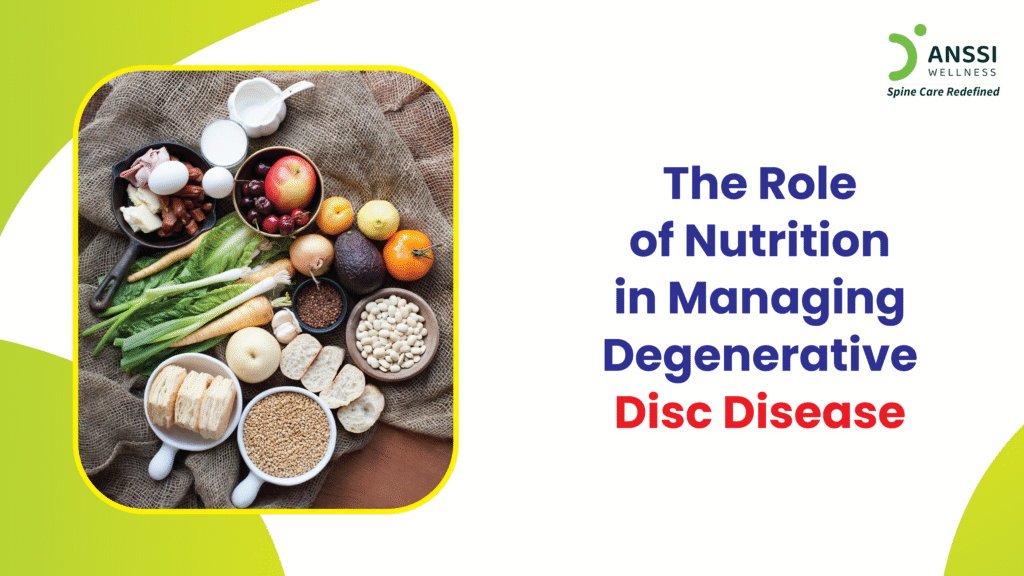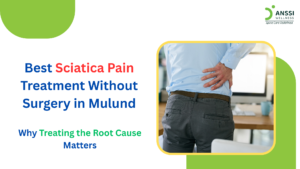Degenerative Disc Disease (DDD) is one of the most common spinal conditions, particularly affecting people as they age. It occurs when the soft, cushioning discs between the vertebrae lose hydration and flexibility, leading to stiffness, pain, and reduced mobility.
While ageing is a natural factor, poor nutrition and lifestyle habits can accelerate disc degeneration. Fortunately, by adopting the right nutritional strategies, you can slow down the progression of DDD and even support the body’s natural healing mechanisms.
Understanding Degenerative Disc Disease and Nutrition’s Role
The spinal discs act like shock absorbers, allowing the spine to move, bend, and twist comfortably. Over time, these discs may begin to dehydrate and wear down, leading to pain, inflammation, or nerve compression. However, nutrition can play a key role in protecting and repairing these discs.
Just like every other part of the body, spinal tissues require essential nutrients to stay strong and flexible. A diet that reduces inflammation, boosts hydration, and supports bone and cartilage health can make a significant difference in managing DDD symptoms naturally.
How Nutrition Impacts Spinal Health
Spinal discs do not receive a direct blood supply like most other tissues. Instead, nutrients reach the discs through a process called diffusion. It means the healthier the surrounding environment, the better the nutrient absorption. Poor dietary choices, dehydration, and inflammation can all interfere with this process.
Inflammatory foods such as refined sugars, trans fats, and processed meats can trigger chronic inflammation in the body, worsening pain and stiffness. On the other hand, nutrient-dense foods can help repair damaged tissue, improve flexibility, and reduce inflammation.
The Power of an Anti-Inflammatory Diet
Inflammation is one of the major drivers of disc degeneration and chronic back pain. Reducing inflammation through diet can therefore help in both prevention and recovery.
Include these anti-inflammatory foods:
- Leafy Greens: Palak, karam saag, and green cauliflower are rich in antioxidants and vitamins that protect against oxidative stress.
- Berries and Citrus Fruits: Contain vitamin C and flavonoids that promote collagen formation and tissue repair.
- Healthy Fats: Olive oil, nuts, seeds, and ghee provide omega-3 and monounsaturated fats that reduce inflammation.
- Spices like Turmeric and Ginger: Contain curcumin and gingerol, natural anti-inflammatory compounds.
- Whole Grains: Brown rice and oats support energy and improve overall health.
At the same time, it’s essential to limit processed snacks, sugary drinks, and fried foods, as these can worsen inflammation and slow down healing.
Hydration: The Key to Disc Flexibility
The spinal discs are made up of nearly 80% water when healthy. This hydration allows them to act as effective cushions between the vertebrae. However, with age or dehydration, discs can lose their water content, becoming thinner and less flexible.
Staying adequately hydrated helps maintain disc height and elasticity.
- Aim to drink at least 8-10 glasses of water daily, more if you engage in physical activity or live in a warm climate.
- Additionally, consuming hydrating foods such as cucumbers, oranges, and melons can further support spinal disc hydration.
Key Nutrients and Supplements for Disc and Bone Health
Certain nutrients are especially beneficial for strengthening spinal structures and reducing DDD progression.
- Omega-3 Fatty Acids: Found in fatty fish like rawas and alsi seeds, omega-3s help lower inflammation and improve joint lubrication. They also reduce stiffness and pain associated with DDD.
- Vitamin D and Calcium: These two nutrients work together to strengthen bones and prevent structural weakness. Vitamin D helps the body absorb calcium effectively, ensuring the vertebrae stay strong and supportive.
- Magnesium: Aids in muscle relaxation, nerve function, and bone density. It can also help reduce muscle spasms caused by spinal instability.
- Collagen and Protein: Collagen supplements, along with a diet rich in protein (like eggs, lean meats, and legumes), support disc tissue regeneration and elasticity.
Before starting any supplement, it’s best to consult a healthcare professional for the right dosage and combination suited to your needs.
Lifestyle and Non-Surgical Support for Spine Health
While nutrition plays a vital role, combining it with other natural approaches provides the best outcomes. Non-surgical spine treatments, such as Spinal Decompression, can help relieve pressure from damaged discs, improve nutrient flow, and support natural healing.
This USA-based treatment gently stretches the spine using a computer-guided decompression system, creating negative pressure within the disc. This allows the herniated or bulging part to retract and rehydrate, restoring its shape and function without surgery or medication.
Additionally, maintaining good posture, staying active, and doing core-strengthening exercises such as yoga or Pilates can help stabilise the spine. Avoid smoking, as it restricts blood flow and accelerates disc degeneration.
Practical Tips for Everyday Nutrition and Spinal Wellness
Start your day with a smoothie containing palak, berries, chia seeds, and almond milk.
- Include at least one serving of fatty fish or plant-based omega-3s weekly.
- Limit caffeine and alcohol intake, as they can dehydrate the body.
- Incorporate turmeric in daily meals for its anti-inflammatory benefits.
- Stay consistent with hydration throughout the day, not just when thirsty.
Small, consistent dietary changes can lead to long-term improvements in spinal strength and flexibility.
About ANSSI:
ANSSI Wellness focuses on improving the quality of life for patients suffering from spinal issues, aiming to provide relief where other conventional treatments have failed. Through advanced Non-Surgical Spinal Decompression Treatment, ANSSI is committed to helping patients avoid surgery and recover in a safe, effective, and compassionate environment.
Connect with ANSSI Wellness on LinkedIn, Instagram, and Facebook for expert guidance.




